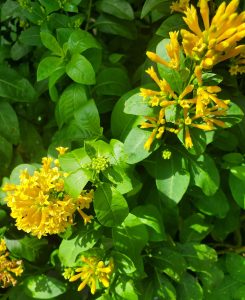
The botanical name given to plants is always exacting in that no matter where you are in the world, the Latin name is used. Common names associated with plants often get in the way and can introduce confusion, but they also can bring descriptive color at a glance inspiring garden designs and plant palette choices. Take the Cestrum aurantiacum as an example and look at its common names – orange cestrum, orange jessamine, orange-flowering jessamine, and yellow cestrum – all the same plant. Let’s learn more about this underutilized ornamental flowering shrub with intriguing common names!
Orange/yellow cestrum is a shrub native to tropical America and a member of the nightshade family – think tomatoes and potatoes. Growing to about four feet-tall and six-feet wide, lance-shaped evergreen leaves provide a background for the four-inch-wide clusters of tubular orange to yellow flowers that steal the show. The flowers are not only beautiful, but during the evening they release a wonderful, sweet fragrance. Cestrum does well in full-sun to part-shade areas for best flowering in any well-drained soil. These shrubs flower from spring through summer but may suffer from minor freeze-damage during the winter in our area – any damage easily regrows in spring. Keep this cestrum in-bounds with minor pruning completed in March. Making new plants is a cinch as it is easily propagated using four-inch tip cuttings with roots developing in as early as two-weeks.
Now for some good news and some bad news about cestrum. First for the good news (and there is plenty of it!) – cestrum is very attractive to hummingbirds and pollinators. This shrub is also moderately drought and salt tolerant – all which make it a Florida-Friendly Landscaping™ recommended plant. Also, unlike some of its relatives namely Cestrum diurnum – day jessamine, and Cestrum nocturnum – night jessamine – which have invasive natures, orange/yellow cestrum is not considered invasive in Florida. Now for the bad news…like some other plants in our landscape, cestrum is toxic to people and pets if consumed. Keep this in mind regarding selection and placement in your landscape.
Orange/yellow cestrum is sometimes available at local garden centers – you will have to check around. I have only seen a few cestrum shrubs planted in local landscapes, so make haste to be the first on in your neighborhood to have one. These multi-purpose shrubs can make a big impact to the eyes and the nose! For more information on all types of underutilized flowering plants, or to ask a question, you can also call the Master Gardener Volunteer Helpdesk on Mondays, Wednesdays, and Fridays from 1 to 4 pm at 764-4340 for gardening help and insight into their role as an Extension volunteer. Ralph E. Mitchell is the Director/Horticulture Agent for UF/IFAS Extension – Charlotte County. He can be reached at 941-764-4344 or ralph.mitchell@charlottecountyfl.gov. Connect with us on social media. Like us on Facebook @CharlotteCountyExtension and follow us on Instagram @ifascharco.
Resources:
Indian River Research and Education Center (2023) Cestrum aurantiacum Yellow Cestrum. The University of Florida Extension Service, IFAS.
(2023) Plant of the Week: Cestrum aurantiacum Yellow and Orange Jasmine. The University of Arkansaw Extension System.
Florida Exotic Pest Plant Council’s 2019 List of Invasive Plant Species. http://bugwoodcloud.org/CDN/fleppc/plantlists/2019/2019_Plant_List_ABSOLUTE_FINAL.pdf.
Plant Finder (2023) Cestrum aurantiacum – Missouri Botanical Garden.
Dino (2020) Cestrum aurantiacum – ONLINE FLOWER GARDEN.
Leichty, M., (2023) Cestrum aurantiacum ‘Orange Zest’ Nursery Management Magazine.
The Florida-Friendly Landscaping™ Guide to Plant Selection & Landscape Design (2022) The University of Florida Extension Services
UF/IFAS Assessment of Non-Native Plants in Florida’s Natural Areas. (2023)
Cestrum aurantiacum (2023) https://en.wikipedia.org/wiki/Cestrum_aurantiacum.
Botanical name (2023) https://en.wikipedia.org/wiki/Botanical_name.
Source: UF/IFAS Pest Alert
Note: All images and contents are the property of UF/IFAS.



